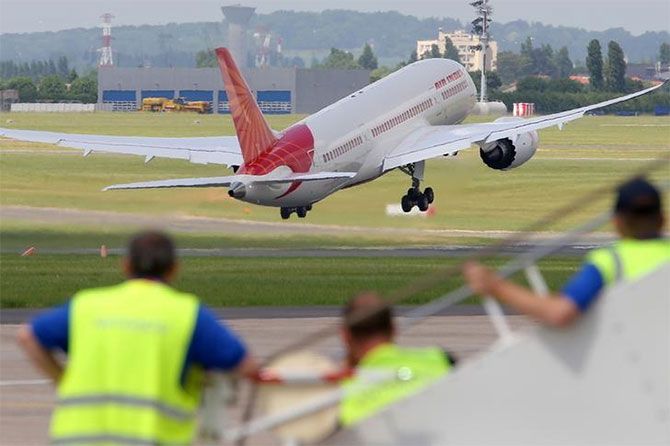Minister of State for Civil Aviation Jayant Sinha emphasised that the brand name has both sentimental and economical value.

Should the national carrier retain its brand name once it is privatised? A group of ministers to be set up to look into Air India's future will decide on it.
"We may have a view on brand name but that is a decision to be made by the Alternative Mechanism (AM).
Are we going to insist on the brand name being retained? Will we give them (private players) the freedom? (on the name).
That is a decision to be taken by the AM," said R N Choubey, secretary, ministry of civil aviation.
Minister of State for Civil Aviation Jayant Sinha emphasised that the brand name has both sentimental and economical value.
"The economically sensible thing to do and the sentimental thing to do will be to keep the Air India brand.
The brand has a value as well as from emotional, sentimental and national perspective it has value. So, we think that anybody who would be interested in Air India would be interested in the brand as well," he said.
With the decision of the Cabinet on Wednesday to grant in-principle approval for divestment of the national carrier, Air India's history has come full circle.
It was nationalised in 1953 because it was perceived as a matter of national prestige. The government is now mulling selling its stakes because of its massive debt of Rs 52,000 crore.
Air India's brand is also likely to carry huge valuation, according to senior officials at the airline.
"If the six-year-old Kingfisher brand was valued at Rs 3,500 crore, the valuation of the over 80-year Air India's brand could be anybody's guess," said a source.
The carrier was born as Tata Airlines when it was established by industrialist J R D Tata in 1932 with an initial investment of Rs 200,000 from Tata Sons and two second-hand de Havilland Puss Moths.
J R D Tata himself piloted a single-engine plane carrying 25 kg of mail from Karachi to Bombay. An occasional passenger would be ferried perched on top of the mail bags.
In 1933, the first full year of operations, Tata Airlines flew 160,000 miles, carrying 155 passengers and 10.71 tonnes of mail.
The airline spread its wings for the first time overseas, to Colombo, in 1938.
During World War II, it was involved in a survey of the South Arabia route, carriage of supplies to Iraq, movement of refugees from Burma and overhaul and maintenance of the equipment of Britain's Royal Air Force.
Tata Airlines went public and became a joint stock company in 1946 and was called Air India Ltd.
On June 8, 1948, Air India International, with the famous Maharaja as its mascot, spread its wings to Europe.
In 1953, a profitable Air India was nationalised though J R D Tata was appointed as the company's first chairman and served in that capacity until 1977, when the new government decided to unceremoniously terminate his services.
J R D's successor Ratan N Tata was later appointed as the chairman of Air India in 1986 and held that post till 1989.
In 2000, the (Atal Bihari) Vajpayee government cleared a proposal to divest its stake in both Air India and Indian Airlines.
Seven years later, both entities would be merged into National Aviation Company of India.
Both these firms were already making losses then, and the merger significantly spiked Air India's costs.
A CAG report in 2011 would later blame the government for causing financial loss by going in for expansion without a proper business plan just before the merger.
The CAG had questioned the rationale behind the government's decision to order 111 airplanes for Air India and Indian Airlines - 48 from Airbus and 68 from Boeing – for about Rs 70,000 crore in 2006 and had called it a "recipe for disaster".
In 2012, the United Progressive Alliance government approved a turnaround plan of Rs 30,000 crore till 2021 for Air India which had dues worth Rs 67,520 crore.
Photograph: Pascal Rossignol/Reuters











 © 2025
© 2025